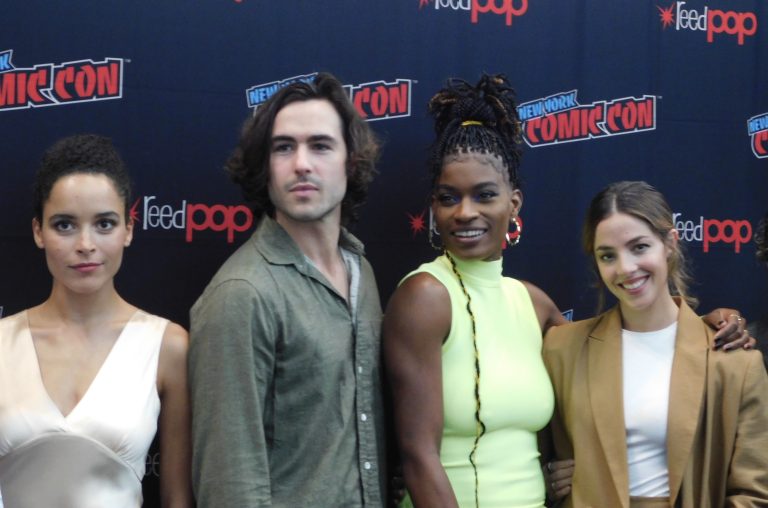
Synopsis : Based on DC Comics’ acclaimed series by Brian K. Vaughan and Pia Guerra, the drama “Y: The Last Man” traverses a post-apocalyptic world in which a cataclysmic event decimates every mammal with a Y chromosome but for one cisgender man and his pet monkey. The series follows the survivors in this new world as they struggle with their efforts to restore what was lost and build something better. “Y: The Last Man” is a 60-issue science fiction comic book series published in 2002.
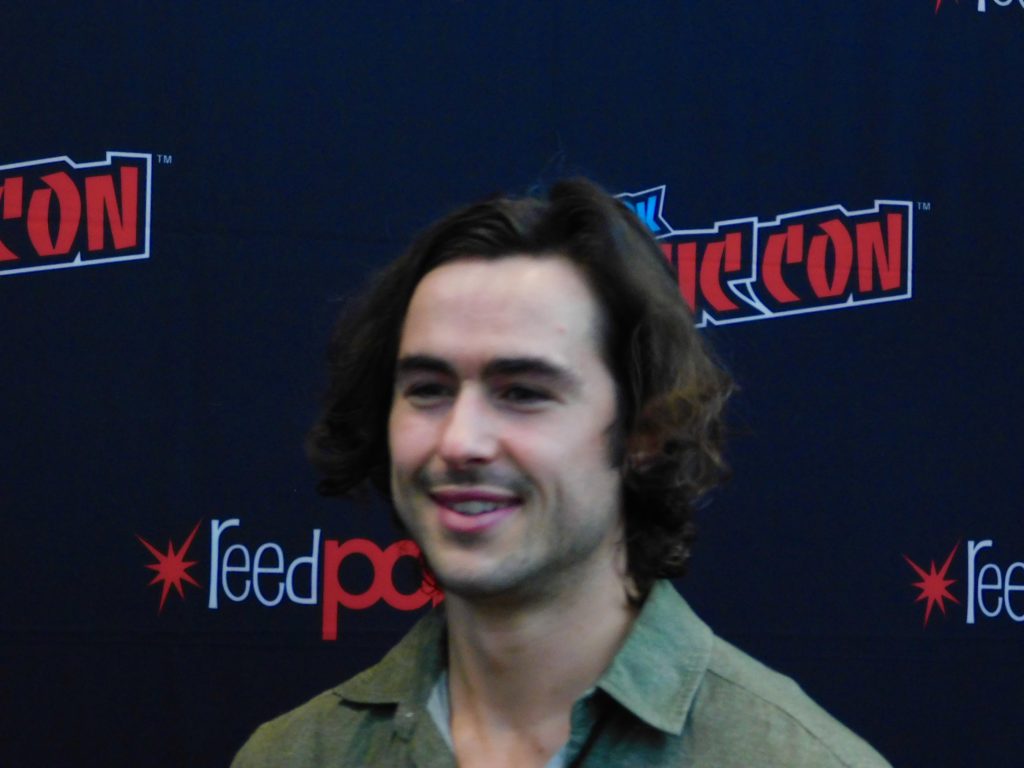
Interview with Actor Ben Schnetzer, Actress Olivia Thirlby, Actress Ashley Romans, Actress Amber Tamblyn, Executive Producer Nina Jacobson, Executive Producer Eliza Clark, Actress Juliana Canfield, Actor Elliot Fletcher and Actress Diana Bang
Q : Initially, New Line Cinema got the rights for Brian K. Vaughan’s graphic novel. And D.J. Caruso was attached to direct, but that didn’t happen. So how did you get the rights of the graphic novel and how did you decide to make a TV series instead of the film?
Nina Jacobson : So it was in development for a long time as a feature. And we had heard that the rights were going to finally revert back to Brian K Vaughn and I loved the graphic novels. I was so captivated by them and I couldn’t put them down. I cried in them. I was really moved by them actually. And so we began the pursuit of these rights and reached out to his representatives to get to know Brian and to make the case for why our company should adapt the graphic novels and do so at FX. And I think it was a combination of both, we’ve worked a lot with source material and being able with adaptations to kind of hold onto your love of the source material while also taking it to a new place for audiences.
And so I think we were able to win him over on that. And then also FX, I think he felt was really the perfect home in terms of sensibility.
Q : You bring great level of humor to the show, which is needed at this point going on. Now, this graphic novel was written in early 2000. Now I believe that, of course the world can be run by women. We all know that, actually better than men. How do you feel now as opposed to when the graphic novel was written to 17, 18 years ago?
Nina Jacobson : I mean, I think one of the most dramatic changes and shifts is in our understanding of the representation of gender and the spectrum of gender… Gender diversity. Twenty years ago, I think we were all much more binary in our language, in our representation, in our pop culture. And one of the things that was most thrilling about doing this with Eli and taking advantage of a character like Dr. Mann was that we have like… It’s a much richer world in a way, to explore once you break out of the binary. And so we were excited for that opportunity, but I also… And as part of what Brian really wanted as a creator, he felt like, “I wrote this after 9/11. I was this age at the time that I wrote it. I’m a different person now. I’ve changed, the world has change. I want somebody to take it from me and reimagine it.” He was never wanted to have a heavy hand at all, kind of the opposite.
Q : Asking about the casting and working with the rest of the actors. What’s that experience like?
Nina Jacobson : Well, we had a very adventurous experience getting the show made because we shot a pilot that we threw out. And we made some changes and we let actors go, If they’d already been with it and kind of ready to move on, we let people go, did not hold people to their contracts. And we were able to then have a cast of people who only wanted to be there and who were all in and hadn’t said yes to one thing, but then kind of inherited another. Yeah, I think the pandemic kind of interrupted that flow.
Q : Flexible and seeing the active strengths and where the writing is going as producers, did you guys find yourself being very flexible and changing with the actors and the writing as well?
Diana Bang : I feel like when I first arrived, because I show up halfway through the season and they all kind of had their grooves. And I felt for me, myself, as well as Dr. Mann, I felt like a bull in a China shop. Kind of coming in and being like, “I’m going to mess everything. I mess up the dynamic between 355 and Yorick. As well as sort of mess up the dynamic between Ashley and Ben, and be like, “Hey guys, I’m part of this now.”
Q : As your character is more of an addition for the show, how do you feel about your place in it?
Elliot Fletcher : I feel great, I know that Sam was not in the graphic novels. Not to toot my own horn, but I think Sam was a great addition. There’s a tremendous community that isn’t featured in the comics.
So to bring that community into the show has been great. I feel great. I really enjoy the position I’m in and the relationship through all the characters involved that I have. So yeah, I’m really loving it. I love Sam.
Q : Could you talk about the impression of the first time you read the graphic novel of Brian K. Vaughan and Pia’s?
Elliot Fletcher: Oh man. I’ve been going to San Diego Comic Con just because I am a nerd for the last- yeah since I was 12. I remember the finale coming out at my first Comic-Con. The finale of the graphic novel series. I think at the time I didn’t understand the concepts. So I read it when I was younger and I think it sort of went over my head, but I was so impressed by it. And now reading “Saga” by Brian K. Vaughan, he’s just a master. So in comparison to the show, I think it’s great in keeping some of the original content and updating some of the new stuff, and bringing in new things. Ryan is so cool about the show and loved it. So it’s been a really awesome process to be a part of that.
Q : When the series opens, we see the hero’s character struggling so much with her mother, with her brother. And of course the opening with you and the actor who played the medic. So do you feel as the series goes on that we’ll see that hero’s going to let some of that guilt go as the world kind of shifts gears?
Olivia Thirlby : Well that’s really her journey through this series, is that it’s not just the trauma of what happens to the whole world. It’s her own personal trauma and the way that that sort of compounded the ways that she was already struggling with her sense of worth and identity. I think that is the journey she’s going on. It’s can she learn to move on and forgive herself before she kind of destroys everything that she loves in the process of hating herself so much. I hope that’s a question that the series answers as we take her on this journey and see the way that she chooses both well and very, very poorly how to navigate her own trauma and the aftermath of what can be chalked up to just a very, very big mistake.
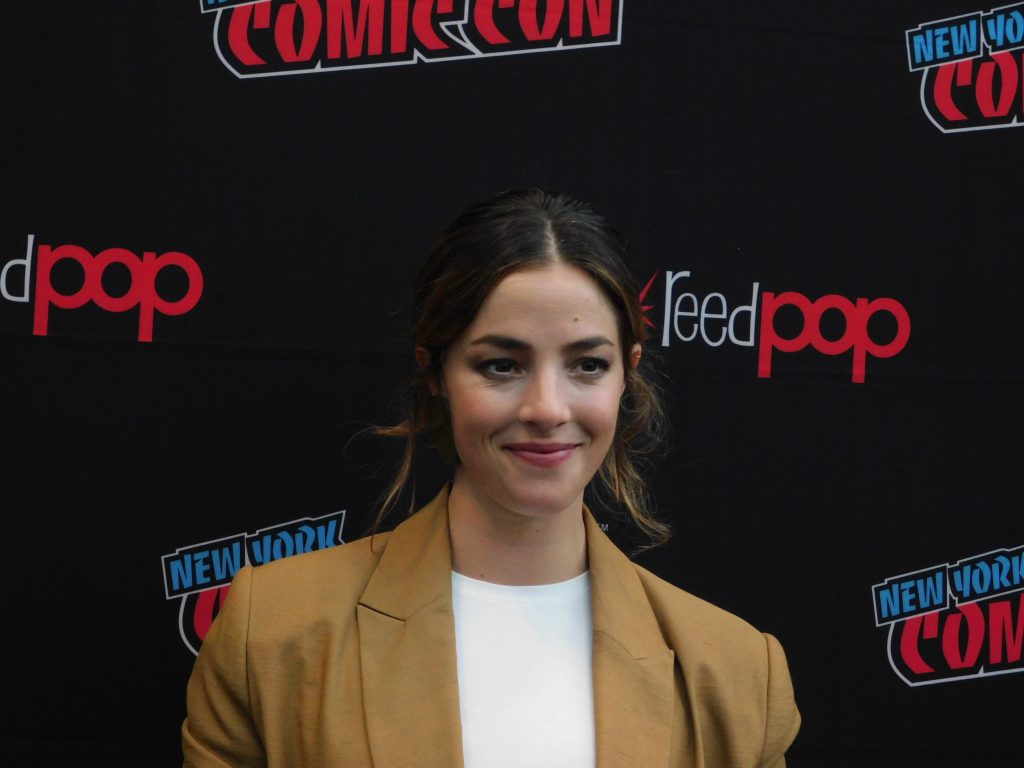
Q : I think the last 10 minutes of the pilot is such an amazing, particularly the way that was filmed. When you sat back and watched it as a fan point of view, how was your reaction to that?
Olivia Thirlby: It was definitely nerve wracking to film it. And really one of those situations where, as an actor, you just have to completely trust the people around you. Luckily Louise Friedberg directed that episode. It was DP’d by Kira Kelly who is completely brilliant. We were shooting in this tiny space. It was a real ambulance where they had cut out sections of the wall so that they could put the camera in, because the camera couldn’t be in the ambulance. It was stunt heavy, there was a lot of choreography and there was a big prosthetic that was involved with it. So it was a lot of moving pieces and it’s hard as an actor to really tell what you did or what you’ve got. And I was nervous about it. Then yes, when I saw it put together it was sort of…A sigh of relief and really big applause to Louise.
Q : Ben could you talk about the arch of your character, your character started off kind of jerk on the first episode, but gradually take on responsibility, so talk about the arch of your character?
Ben Schnetzer: Yeah. I wanted to give Yorick a lot of runway. It was very compelling to me that he’s not a willing participant he’s a reluctant figure and the position he finds himself in, he sees it very much as a burden and the concept of someone having to work against himself was very compelling for me. In the writing, they didn’t shy away from exploring the very unheroic elements of Yorick. And I thought that was really brave and really fun. And I thought it was, for me, it was very exciting to lean into that, to lean into he’s pretty self-centered and he’s pretty privileged. And to give him room to find a world bigger than himself, find that. And to give these lessons, I didn’t want him to… It wasn’t as interesting if he starts there already. So yeah.
Q : Could you talk about the collaboration, working with Diane Lane?
Juliana Canfield: She’s fabulous. What I’ll say is that she’s been doing this for a really long time and she’s such a star. And I mean that in terms of her personality, not just in terms of her career and she feels really old school, she is there to work. She has tons of ideas. She knows her way around a camera and she helps everybody on set.
Ben Schnetzer: Totally.
Juliana Canfield: Not just the actors and she’s always looking out for us and for the crew.
Ben Schnetzer: Yeah. I cannot say enough good things about her. She’s one of the most generous performers I’ve ever worked with.
Q : Are there any episodes that stood out for you?
Ben Schnetzer: There’s a moment in episode three, where I got a note from the director, they said, “Hey, Ben, I’d love for you to just, reach over and take Diane’s hand on this line.” And I said, “okay, sure. Yeah.” And so we go to do the scene and the beat right before, “Diane, we’re doing a take” and she just like breaks down. And so organically, I just had an impulse to reach out to her and take her hand. And the note wasn’t to her, the note was to me, but she heard it and just played like she passed me the ball. And that’s what when you’re really flowing, that’s what our job is about. And that’s a very generous thing to do for your fellow actors.
Q : Do have a background in athletics before you took on this role of the bad-ass?
Ashley Romans: Yeah, I would say I was pretty athletic. Like in high school I did rugby for a few years. That was a good time. I never thought I would use rugby, but I learned I had to tackle a few people or tackle a couple of times in episode 6 so that came in handy. And I was actually working at a yoga studio for a few years when I was in LA, like five years I was in LA. That was basically the extent of my athletics.
Q : Because of the covid, you guys had to move the shoot from summer to winter. What was the challenge shooting in winter in Toronto?
Ashley Romans: Winter in Toronto… Winter in Toronto was intense, specifically during the fight scenes actually, or actually any outside scenes were really intense, because like in episode two, I’m walking in the snow, we filmed that the morning of a blizzard. So it had blizzard in Toronto that morning and he still went in. I swore, I thought they were going to call it. And then they’re going to say, “Hey guys, we can’t, we have to have a snow day, we can’t.” Nope. They said we’re going to show up anyway. And it looked really good because there was that cool drone shot where the snow just looked untouched. And that was fantastic and completely worth it. But yeah it made your body stiff and… You know episode four was still a little chilly, so my body would get stiff if I had to fight and then I would have to come back out and fight again. But for the most part, they were pretty good at keeping everybody warm.
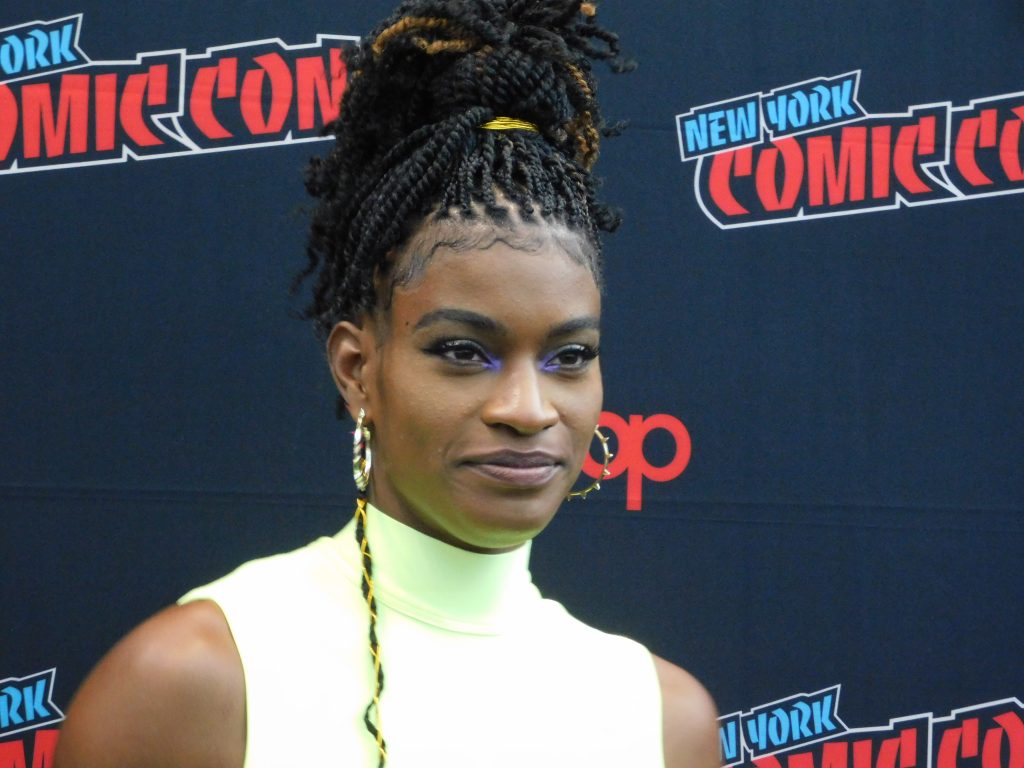
Q : What were your thoughts when you found out you got the role on such a very woman empowered show?
Ashley Romans: Yeah, well I when I found out I got an email from Eliza Clark, I was expecting to hear from my agents first and foremost, but Eli emailed me in the evening and it said, “Hey, just want to let you know, I’m really excited to have you on the show.” And I jumped up and down and I was really happy. And I was really excited mostly because… What I was mostly excited about was the demand on myself that this character was asking from me. This character is definitely a person I would like to step into because she’s super disciplined. And she’s super focused and… okay I was thinking, how does she think? How does she view that? Her almost ruthless pragmatism. I was really interested in stepping into that line and also some of her habits.
Q : What’s amazing about this show…it’s not just actress in front of the camera, but also that behind the camera, a lot of female staff was involved. Talk about working with those female empowerment like that on the set?
Ashley Romans: Yeah it was wild. I had never worked with two female DP’s, directors of photography, before. I’ve never worked with this many female producers. It was such an inclusive experience. I’ve been really lucky my career that I’ve gotten to work with really awesome people. And the thing is though, it’s so interesting when you see things specifically from the female gaze. Violence is treated differently. I think nudity is treated differently on this show. The conversations in the writer’s room are just really expansive. And it was quite the treat to work alongside these people.
Q : The Walking Dead from the comic books, a lot of changes from the source material onto the translation to the big screen or television, were there any changes in this show
Amber Tamblyn : Oh yeah. I don’t ever really read the source material, but just because I want to come to it fresh. I mean, in the beginning, in book one, there’s a lot of the women in the Pentagon who are fighting with Jennifer Brown and you see a lot of the conservative women and I sort of told myself that… So I looked through the first book a little bit and I told myself that Kimberly was one of those characters that was sort of painted drawn in the back background without a line, who was sort of voiceless, which I think is a really great metaphor for her existence in the show, at least how you first see her. And then she morphs into a much more terrifying and complicated person later in the season.
Eliza Clark : I think about adaptation as, especially of a comic book, which I think comic books are their own medium, they’re a… I think Hollywood has this sort of poaching mentality where it’s like, well take IP and make it something else. I really don’t think that this book needs to be adapted. It is its own thing. It’s beautiful, and you can read it anytime. So the way that I, and Brian and Pia were so generous with me to say “it’s yours now,” and I think they could say that to me knowing I loved it, but as a fan, you want to watch something where you’re like, “oh, maybe that’s the daughters of the Amazons? I don’t know,” like, “oh, I’m seeing what they’re doing here, but I’m kind of in on it.” I think that’s fun, and I don’t think you really want to see something that’s just a shot for shot of what you’ve already read.
Q : I think Amber’s character is a character who, like some people in the pandemic, had to kind of stick to their routines who… She’ll do anything to get that crazy eyeliner on.
Amber Tamblyn : Yeah, I mean, that was one of the fun things to sort of bind with the character too, is just because there is an apocalypse because these areas that kind of… Giant trauma that happens to the world and a huge aftermath, it doesn’t mean that women stop being women to a certain degree, and especially women like Kimberly. She reminds me of some girlfriends I had in high school in Orange County, in Los Angeles, who would wake up and before they even brush their teeth or have coffee, they put heavy eyeliner on, they always had acrylic nails, they would not be caught dead without their makeup on in any situation, and Kimberly is kind of part of that, which I think makes her some of the very morbid comic relief of the show is that she is stuck in the past and a lot of that is going to create a lot of problems for her.
Eliza Clark : And then you see the other women in the Pentagon, who are wearing sweatshirts and just trying to get their work done, and we thought about that a lot. I think that the last two years have been very earth-shattering in many ways and the pandemic is one of them, but I think we were about to start shooting and we were two weeks out from shooting when COVID hit, and then we came back in October to start for real, and over the summer we had a racial reckoning and that, I think, in some ways, had so much more to do with what gets built into the show because I’m more interested in that, and the conspiratorial thinking and the tribalism that happens when something terrifying happens and you have to stick to the people who mirror your worldview or whatever, but I don’t want to think about COVID. I want it to be over.
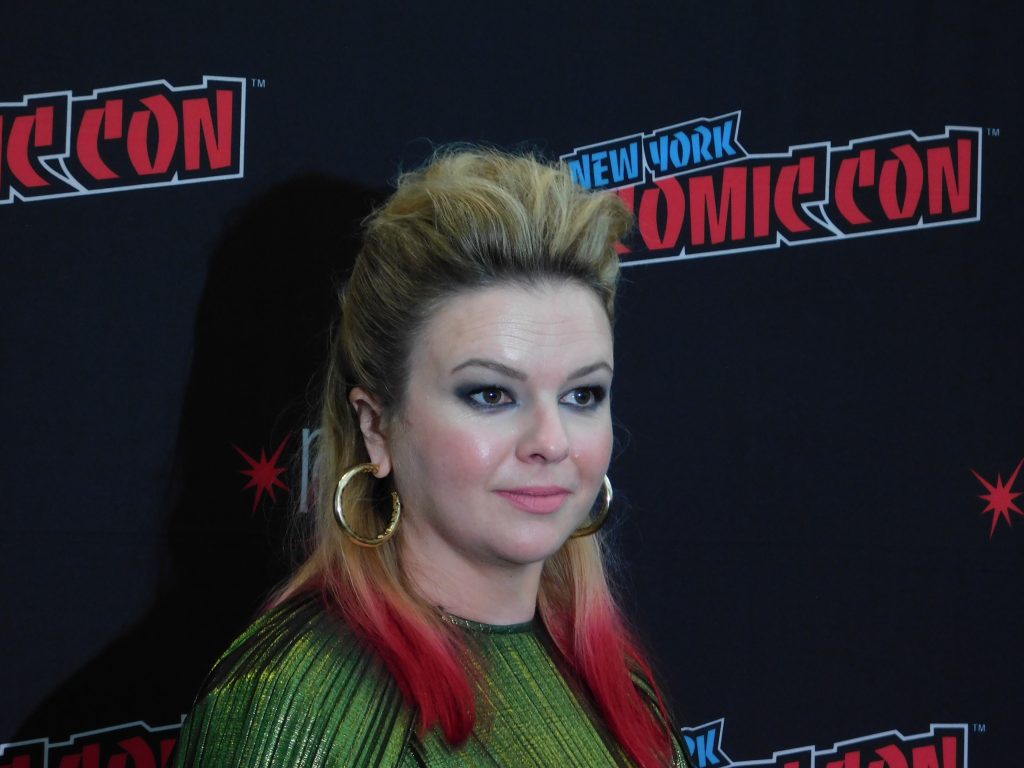
Here’s the trailer of the film.
https://www.youtube.com/watch?v=0EEQ5Lj-cXM

